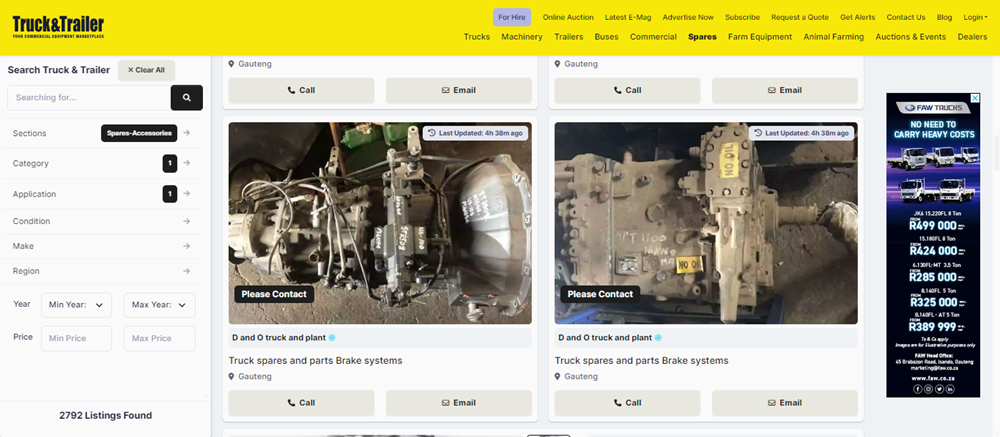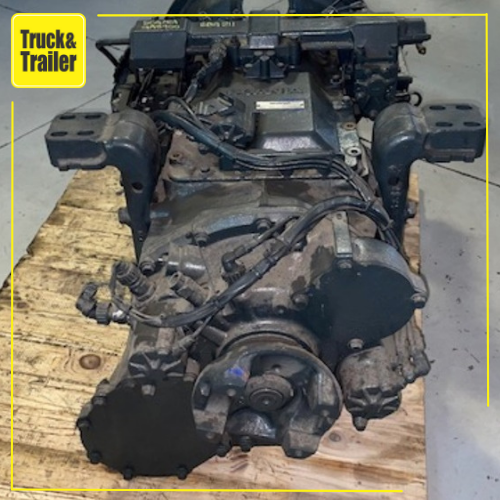The efficient functioning of a truck's brake system is paramount for ensuring safety on the roads. From bustling urban streets to rugged rural terrains, trucks play a crucial role in transporting goods across the country. Understanding the components of a truck brake system is essential not only for truck drivers but also for fleet managers and maintenance personnel. In this guide, we delve into the intricacies of the components comprising a truck brake system, highlighting their significance in ensuring smooth and secure journeys. Become a spares and accessories dealers on Truck & Trailer and start selling to la large number of people.

Components of a Truck Brake System:
1. Brake Pedal:
The brake pedal serves as the primary interface between the driver and the brake system. In South Africa, where road conditions can vary drastically, the brake pedal must be responsive and easy to modulate. This allows drivers to effectively control the braking force applied to the wheels, enabling safe deceleration and stopping.
2. Brake Lines:
Brake lines are crucial conduits that transmit hydraulic pressure from the brake pedal to the brake calipers or wheel cylinders. In the country's diverse climate and terrain, durable brake lines are essential to withstand varying temperatures and road conditions. Regular inspection and maintenance of brake lines are imperative to prevent leaks or ruptures that could compromise braking performance.
3. Brake Calipers:
Brake calipers are responsible for housing the brake pads and exerting pressure on the brake rotors to generate friction, thereby slowing down the wheels. In the country's challenging driving environments, brake calipers must be robust and resistant to corrosion. Proper lubrication and periodic inspection of brake calipers are vital to ensure optimal braking efficiency and longevity.
4. Brake Rotors:
Brake rotors, also known as brake discs, are critical components that rotate with the wheels and undergo frictional contact with the brake pads to facilitate braking. In a country, where trucks encounter diverse terrains ranging from steep mountain passes to bustling city streets, high-quality brake rotors are indispensable for reliable performance and heat dissipation. Regular inspection for wear and warping is essential to maintain braking effectiveness and prevent brake fade.
5. Brake Pads:
Brake pads are essential elements that press against the brake rotors to generate friction and facilitate vehicle deceleration. The demanding driving conditions of this country, durable brake pads are necessary to withstand frequent use and varying road surfaces. Routine inspection and replacement of brake pads are crucial to ensure optimal braking performance and minimise the risk of brake failure.
6. Brake Fluid:
Brake fluid plays a pivotal role in transmitting hydraulic pressure within the brake system, facilitating the transfer of force from the brake pedal to the brake components. In the diverse climate, brake fluid must have excellent thermal stability and resistance to moisture absorption to maintain consistent braking performance. Regular inspection and replacement of brake fluid are essential to prevent brake fade and ensure safe braking operation.
Benefits of Maintaining a Truck Brake System:
Enhanced Safety: Regular maintenance of the truck brake system significantly reduces the risk of brake failure, ensuring safer journeys for drivers, passengers, and other road users. By keeping the brake components in optimal condition, drivers can react swiftly to unexpected hazards and emergencies, minimising the likelihood of accidents and collisions.
Improved Performance: Properly maintained brake systems deliver consistent and reliable braking performance, allowing drivers to control their vehicles with precision and confidence. By ensuring that components such as brake pads, rotors, and calipers are in good condition, truck operators can achieve smoother braking and more efficient stopping, enhancing overall vehicle handling and responsiveness.

Extended Lifespan: Regular maintenance not only enhances performance but also extends the lifespan of brake components. By promptly addressing issues such as worn brake pads, leaking brake lines, or corroded calipers, truck owners can prevent costly damage to other brake system parts and avoid premature component failure. This proactive approach helps maximise the longevity of the entire braking system, reducing the need for frequent replacements and repairs.
Cost Savings: Investing in preventive maintenance of the truck brake system can lead to significant cost savings in the long run. By addressing minor issues before they escalate into major problems, truck operators can avoid costly repairs, downtime, and potential fines resulting from brake-related accidents or failures. Additionally, maintaining optimal braking performance can improve fuel efficiency and reduce wear on other vehicle components, further lowering operating expenses.
Legal Compliance: In South Africa, compliance with regulatory standards and safety requirements is essential for commercial truck operators. Regular maintenance of the brake system ensures that vehicles meet or exceed legal standards for brake performance and safety. By staying proactive in brake system maintenance and documentation, truck owners can demonstrate compliance with relevant regulations, mitigating the risk of penalties or legal liabilities associated with brake-related incidents.
In summary,, the components of a truck brake system are integral to ensuring safe and efficient transportation across diverse terrains and climates. From the brake pedal to the brake fluid, each component plays a crucial role in maintaining optimal braking performance and safeguarding lives on the road. By understanding the intricacies of these components and adhering to regular maintenance schedules, truck drivers and fleet managers can uphold the highest standards of safety and reliability. As technology advances and road conditions evolve, continuous innovation and vigilance in brake system maintenance will remain paramount in enhancing road safety and promoting sustainable transportation practices. Start selling to a big customer base by becoming a dealer for spares, parts and accessories on Truck & Trailer.




